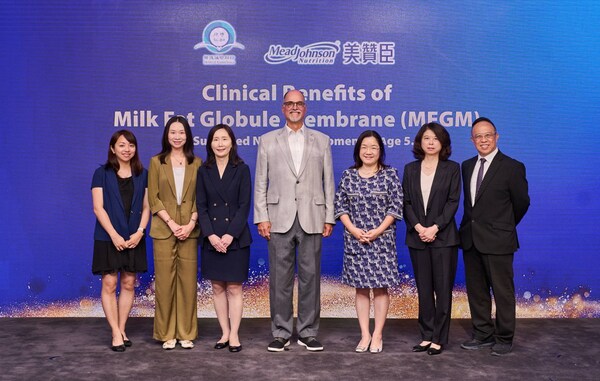Health
Healthcare Experts Examine Early Nutrition’s Impact on Child Development

On September 15, 2025, over 100 healthcare professionals gathered in Hong Kong for the Paediatric Nutrition Symposium, organized by Mead Johnson Nutrition in partnership with Medical Conscience. The symposium focused on the critical role of Milk Fat Globule Membrane (MFGM) in fostering brain and immune development in infants and young children.
Exploring MFGM’s Role in Child Development
The event’s theme, “Clinical Benefits of Milk Fat Globule Membrane (MFGM) for Sustained Neurodevelopment at Age 5.5,” highlighted recent advances in understanding how MFGM contributes to long-term cognitive outcomes. Distinguished speakers included Prof. Rafael Jimenez-Flores, a noted expert from The Ohio State University, and Dr. Sylvia Doo, a specialist in Developmental Behavioural Paediatrics. They shared insights into the profound implications of early nutritional intake on children’s growth.
In her presentation, Dr. Doo emphasized the importance of breastmilk, stating, “Breastmilk provides brain-building nutrition for infants, and its rich bioactive nutrients are delivered to the infant via MFGM.” She pointed out that MFGM contains crucial components such as phospholipids and gangliosides, which are essential for the development and maintenance of the central nervous system.
A significant clinical study conducted by Mead Johnson in Mainland China revealed that infants who consumed formula enriched with MFGM during their first year exhibited superior cognitive, language, motor skills, and sustained attention at 12 months compared to those on standard formula. Follow-up evaluations at 5.5 years of age indicated that these children had higher full-scale IQ scores and improved visual-spatial abilities.
Innovative Production Techniques for MFGM
Prof. Jimenez-Flores highlighted the necessity of advanced production technologies in incorporating MFGM into infant formula. He stated, “Maintaining the integrity and bioactivity of MFGM components is crucial during manufacturing.” By utilizing high-quality milk sources, these techniques preserve the structural properties of MFGM, ensuring its effectiveness in supporting brain development.
Research corroborating the benefits of MFGM has emerged from various countries, including Sweden and Japan, further validating its positive impact on infants’ neurological and immune development. Ms. Fion Xiong, Head of R&D and Quality Food Safety for Mead Johnson China, remarked on the company’s longstanding commitment to innovation in pediatric nutrition. “Since launching our first MFGM-enriched product in 2016, we have set a precedent in the industry,” she noted.
Mead Johnson, established in 1905, has built a reputation as a leader in science-based pediatric nutrition. Their dedication to research and development has positioned them as a trusted brand among parents and nutritionists alike. The symposium also included interactive discussions and a Q&A session, fostering dialogue among attendees regarding MFGM’s benefits.
The findings discussed at the symposium reinforce the importance of early nutrition in shaping a child’s cognitive and immune capabilities, underscoring a commitment to advancing pediatric health through innovative research.
-

 Lifestyle3 months ago
Lifestyle3 months agoHumanism Camp Engages 250 Youths in Summer Fest 2025
-

 Sports3 months ago
Sports3 months agoDe Minaur Triumphs at Washington Open After Thrilling Comeback
-

 Business4 months ago
Business4 months agoKenvue Dismisses CEO Thibaut Mongon as Strategic Review Advances
-

 Sports4 months ago
Sports4 months agoTupou and Daugunu Join First Nations Squad for Lions Clash
-

 Top Stories4 months ago
Top Stories4 months agoColombian Senator Miguel Uribe Shows Signs of Recovery After Attack
-

 World4 months ago
World4 months agoASEAN Gears Up for Historic Joint Meeting of Foreign and Economic Ministers
-

 Business4 months ago
Business4 months agoOil Prices Surge Following New EU Sanctions on Russia
-

 Health3 months ago
Health3 months agoNew Study Challenges Assumptions About Aging and Inflammation
-

 Entertainment3 months ago
Entertainment3 months agoDetaşe-Sabah Violin Ensemble Captivates at Gabala Music Festival
-

 Entertainment3 months ago
Entertainment3 months agoBaku Metro Extends Hours for Justin Timberlake Concert
-

 Business4 months ago
Business4 months agoU.S. House Approves Stablecoin Bill, Sends to Trump for Signature
-

 Top Stories4 months ago
Top Stories4 months agoRethinking Singapore’s F&B Regulations Amid Business Closures









